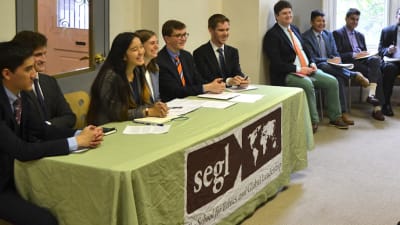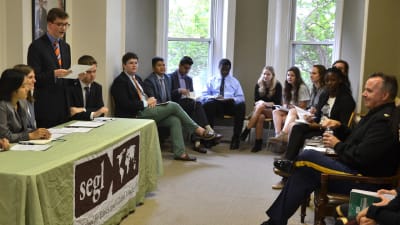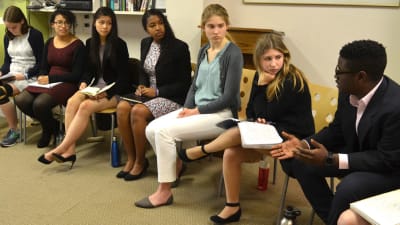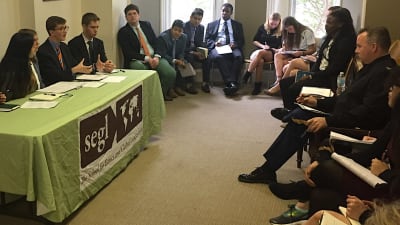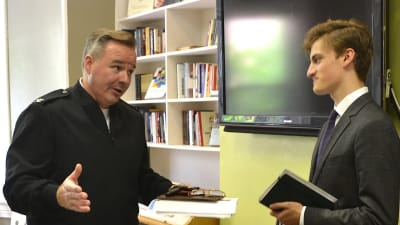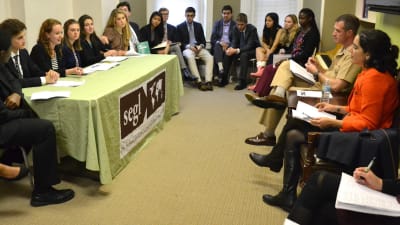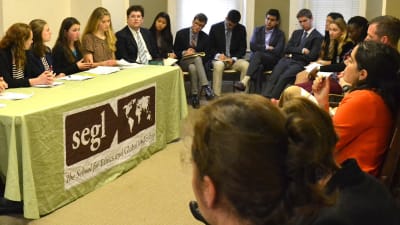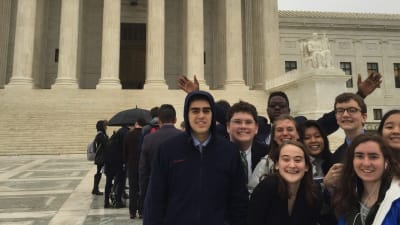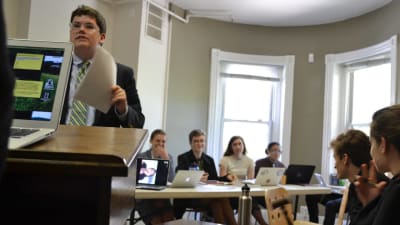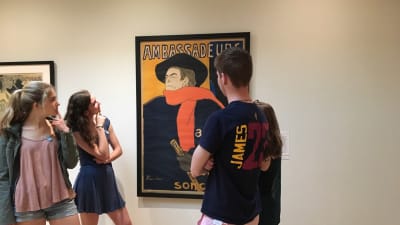Spring 2017 presents capstone policy document to Pentagon, think tank experts
What is it like to argue a case in front of the Supreme Court? To testify before Congress? To defend a PhD thesis? In the last few weeks our students got a taste of those challenges when they presented their capstone policy document on drone strikes to a leading Pentagon expert.
The collaborative policy document (or “CPD,” as our students call it) is one of SEGL’s most difficult challenges. Each SEGL cohort must select a current international crisis, research that crisis and collaboratively craft a 40-page scholarly document which is then presented and defended in front of real-world policymakers.
This spring chose the United States’ drone strikes against ISIS as its topic. After making this decision, the students split into five sub-groups, each with a different area of expertise. The groups researched the current situation and drafted specific practical recommendations.
They then spent a day in the George Washington University main library, with full access to the University’s resources. David Ettinger (the top international relations/political science research librarian at GW), who has been a student favorite since our first semester, started with an entertaining orientation session so that the students know how to use the myriad databases in the GW system (this is also good preparation for undergraduate life!), and then the students were off to the many corners of the building.
The research process also involves contacting experts for phone and in-person interviews. This requires ingenuity and a bit of courage and often leads to excitement and insight. For example, one group met with the Director of Political and Diplomatic Affairs at the Kurdish Regional Government mission; another spent 20 minutes on the phone with Michael Walzer, arguably the greatest living Just War theorist.
After compiling their research for several days, the students created rough drafts that our faculty critiqued (often as stridently as a Supreme Court Justice, Member of Congress, or dissertation committee member might!). They discuss, disagree, research, and revise, and then it is time to present. Each semester we try to meet with on-the-ground policymakers who have the ability to incorporate our students’ ideas into actual policy.
This semester we first welcomed Col. Charles Moore, the Chief of the U.S. Army Strategy, Concepts, and Doctrine Division. In this position, he is responsible for crafting the Army’s strategic plan, which of course includes the role of drones.
Often we visit our expert’s place of business, but due to security protocols at his Pentagon offices, he came to our Academic building. For the better part of two hours, he prodded, complimented, and challenged our students, engaging them in a provocative and meaningful exchange.
One of his key themes: when thinking about military operations, one must consider objectives, tools, and means. Many military leaders hope policymakers clearly communicate an operation’s objectives, so that military leaders can use tools and means to achieve that objective effectively and efficiently. Some military leaders chafe when policymakers do not set clear objectives, or when they get involved in tools and means discussions. On the other hand, military leaders often do not have to include political or financial considerations into their calculus. This tension was great food for thought.
Moore stayed after his allotted time to answer a flurry of student questions. (We wish we could report more details of the meeting, but of course it was off-the-record. Check with one of our students to get more information!)
We presented again a week later to Melissa Dalton and Commander Brandon Scott. Dalton is Deputy Director of the International Security program at Center for Strategic and International Studies, one of DC’s leading think tanks. During the Obama Administration, she was Senior Advisor for Force Planning to the Secretary of Defense. In this role, she focused on how to create and sustain the best possible U.S. military capacity. Commander Scott has a long military career, most recently commanding the”Ragin’ Bulls,” a United States Navy F/A-18C Hornet fighter squadron.
The students afterwards were excited (and relieved!). They had done the research and had the preparation to engage in a real conversation about a sophisticated current issue with a leading military expert. What an accomplishment!
Want to read the document for yourself? You can download it here.
Below there are photos of the “Review Panel” presentation to SEGL faculty, the presentation to Moore, and the presentation to Dalton and Scott. There are also pictures of students with Syrian activist Mohammad Al Abdallah (following up on the recent U.S. intervention in Syria), waiting to hear a Supreme Court oral argument (one of Justice Gorsuch’s first!), participating in a U.S. History mock trial (of Harry Truman for dropping the atomic bombs), and taking in a little Toulouse-Lautrec at the French Embassy.








